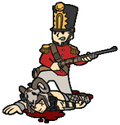|
Farecoal posted:
As far as i know the Umayyads didn't even direct the Iberian conquest. All of it (or the majority) was done by North African Berbers that were invited into the peninsula. France was nothing more than a raiding place. They would cross the Pyrenees to loot and plunder and then come back to the safe and easily defended peninsula. The battle however was vital to cementing Charles Martel and the resulting Carolingian dinasty that helped shape Western Europe.
|
|
|
|

|
| # ? Jun 10, 2024 00:56 |
|
canuckanese posted:For the Romans it made much more sense to leave the Rhine as the border because troops were relatively easy to supply via the Rhine and Mosel rivers, which basically go all the way to the Mediterranean. From what I understand, the Roman wars with the Germanic tribes were more to keep them in check rather than any attempt to actually conquer their lands. The Mosel flows into the Rhine which empties into the North Sea/English Channel in present day Belgium. That's a long assed way from the Med.
|
|
|
|
wins32767 posted:The Mosel flows into the Rhine which empties into the North Sea/English Channel in present day Belgium. That's a long assed way from the Med. Very poorly worded on my part, it was late when I wrote that. What I meant to say was that it was easy to supply troops along the Rhine because of it's proximity to the Mediterranean since it starts in the Alps, as well as with supplies from Gaul via the Mosel.
|
|
|
|
Mr. Sunshine posted:However, was there ever a point prior to industrialization where the same held true? Where both sides in a conflict were rapidly trying to out-invent each other? You could make a case out of the Thirty Years War, where artillery and tactics evolved fairly rapidly.
|
|
|
|
Major sieges are kind of equivalent. While the basic siege and counter-siege techniques were usually common knowledge, local conditions did matter. Tyre, Masada and so forth.
|
|
|
|
What was the first military?
|
|
|
|
YOUGAY posted:What was the first military? http://www.youtube.com/watch?v=xd3-1tcOthg&feature=player_detailpage#t=88s As soon as people starting fighting each other in an organized fashion, so there's no exact date.
|
|
|
|
Well as far as the evidence goes, Sargon of Akkad led the first force that we would recognize as an 'army' and he managed to keep tens of thousands supplied in the field. This is a super interesting topic though so I hope someone else can chime in.
|
|
|
|
In Stephen King's newest one he imagines an alternate timeline where Kennedy survived Dallas. This timeline basically played out with minimal US involvement in Vietnam (defending Saigon, mainly, and injecting cash instead of troops). Saigon ends up surrounded and isolated like Berlin all over again. A very right wing hawk is elected president as a result of the popular backlash against JFK, and this president actually pulls the trigger and uses nuclear weapons on Hanoi. Was curious if this was complete fantasy or actually a plausible outcome. Given the author, it'll likely become the most-read alternate theory out of any of them.
|
|
|
|
An interesting fact for the lawyers in this thread - the reason that we have two major legal systems in the world (common law and civil law) is basically due to the Normans. The English common law was established after William the Conquerer did his thing in 1066. In mainland Europe, Roman law was revisited during the 1400s-1500s and took root across the continent. England was the only country with a legal system so firmly established that they could continue to do their own thing. Who knows what would have happened if the timing was a couple of hundred years closer together. The difference is especially obvious in the law of real property - the civil law system is about the rights of the individual, the common law is based on using the land with the permission of the Crown. (And common law property law actually makes a lot of sense, as long as you remember that the implicit purpose was pretty much always to transfer your property to the Crown).
|
|
|
|
YOUGAY posted:What was the first military? If we're going to go for a definition of 'military' as 'an organised military force' (as opposed to a group of people who fight together) then the first military would have come about when the first human settlements made the decision to organise a militia for their own defence. The only reason these people would have felt the need to organise their own defence is if they were threatened by an organised offence though, so we can posit some hypothetical scenario where two settlements come into conflict over some resource existing between them (farm or hunting ground or what have you) and one organises to expel the other. The other organises in response - presto! Instant citizen armies!
|
|
|
|
YOUGAY posted:What was the first military? The answer lies in Mesopotamia, they were usually the first of everything.
|
|
|
|
Schitzo posted:In Stephen King's newest one he imagines an alternate timeline where Kennedy survived Dallas. This timeline basically played out with minimal US involvement in Vietnam (defending Saigon, mainly, and injecting cash instead of troops). Saigon ends up surrounded and isolated like Berlin all over again. A very right wing hawk is elected president as a result of the popular backlash against JFK, and this president actually pulls the trigger and uses nuclear weapons on Hanoi. Nuking Hanoi would certainly provoke a nuclear reprisal from Moscow, which would lead to all out nuclear war. Any president would know this, they would have to be absolutely insane to give that order, and it would probably not be followed if given.
|
|
|
|
Schitzo posted:The English common law was established after William the Conquerer did his thing in 1066. In mainland Europe, Roman law was revisited during the 1400s-1500s and took root across the continent. England was the only country with a legal system so firmly established that they could continue to do their own thing. I have a hard time seeing Sweden fitting this description.
|
|
|
|
Alchenar posted:If we're going to go for a definition of 'military' as 'an organised military force' (as opposed to a group of people who fight together) then the first military would have come about when the first human settlements made the decision to organise a militia for their own defence. How would such a force differ from a wandering tribe of hunter-gatherers? If two tribes clash over hunting grounds, it stands to reason that they would both organize raiding parties against the other. No need for permanent settlement. If you want the first military force who's makeup isn't "Every man who can hold a weapon", then I would say Mesopotamia as well, since it was there that agriculture yielded enough to support men who literally did nothing but stand around and wait for a fight to start.
|
|
|
|
Schitzo posted:England was the only country with a legal system so firmly established that they could continue to do their own thing. You are aware that Scotland was an independent country in the Middle Ages, right?
|
|
|
|
ArchangeI posted:How would such a force differ from a wandering tribe of hunter-gatherers? If two tribes clash over hunting grounds, it stands to reason that they would both organize raiding parties against the other. No need for permanent settlement. I think that the term 'military' implies an organisation that's identifiably distinct from 'the whole of society'. That requires a civilisation that's settled and is able to support professions other than subsistence farming. That's just quibbling over our definitions though.
|
|
|
|
Konstantin posted:Nuking Hanoi would certainly provoke a nuclear reprisal from Moscow, which would lead to all out nuclear war. Any president would know this, they would have to be absolutely insane to give that order, and it would probably not be followed if given. Which makes it even more mind boggling this conversation ever happened: http://www.youtube.com/watch?v=wGVfzwvtlJM
|
|
|
|
Konstantin posted:Nuking Hanoi would certainly provoke a nuclear reprisal from Moscow, which would lead to all out nuclear war. Any president would know this, they would have to be absolutely insane to give that order, and it would probably not be followed if given. I think you overestimate everyone's willingness to employ a full nuclear reprisal. Thailand, for instance, was an ally of the US in the Vietnam War. If the USSR had nuked Bangkok for some reason, do you really see the US initiating a full scale nuclear war over that? The reason we didn't employ nuclear weapons in smaller conflicts wasn't out of a serious fear of it directly resulting in nuclear war, it was out of a fear of escalation. No one wanted to see a scenario in which nukes joined the standard arsenal of warfare. Not that we weren't prepared for it; we still have soldiers who are specifically trained in nuclear demolitions and such. Half of our plans for the Fulda Gap relied on the use of nuclear demolitions not so much to kill enemy soldiers, but as tactical demolitions and area denial weapons.
|
|
|
|
I believe King said in the acknowledgement that he consulted with a political scientist or something about what a worst-case scenario would be if Kennedy wasn't assassinated.
|
|
|
Schitzo posted:In Stephen King's newest one he imagines an alternate timeline where Kennedy survived Dallas. This timeline basically played out with minimal US involvement in Vietnam (defending Saigon, mainly, and injecting cash instead of troops). Saigon ends up surrounded and isolated like Berlin all over again. A very right wing hawk is elected president as a result of the popular backlash against JFK, and this president actually pulls the trigger and uses nuclear weapons on Hanoi. Kennedy was pretty loving far from a dove with regard to fighting communism. Eisenhower may have sent some advisers over but the US involvement in Vietnam expanded significantly under Kennedy.
|
|
|
|
|
Amused to Death posted:Which makes it even more mind boggling this conversation ever happened: "Does it bother you?" Well to be honest it kind of does.
|
|
|
|
Fish of hemp posted:"Does it bother you?" I'm no fan of Nixon but to be fair, he was head of one of the nuclear superpowers and had to at least consider using the bomb and what effects it would have. Here he is asking his national security advisor about it. Just because he had to consider all peaceful alternatives does not mean he did not have to consider non peaceful ones too. I'm against any use of nuclear force but this is a type of question almost every US president since the second world war has had to ask their advisers and themselves, with good reason. edit: without showing more about what happens in the rest of the conversation that video seems pretty dumb to me. NLJP fucked around with this message at 08:19 on Feb 21, 2012 |
|
|
|
ripped0ff posted:Fulda Gap On a sidenote, the use of this as an analogy for the whole central european battle-line is kinda starting to wear thin. The so called 'gap' is only a less than 20km wide river valley through readily defensible terrain. Yes, it presented an opportunity for a local Soviet breakthrough but there was a 700km+ front-line in the AFCENT area alone. Any local or regional terrain feature could have gotten a 'gaplike' mythological status had anyone actually fought over it. As a synecdoche it's both extremely reductionist and way too US-centric to be taken seriously.
|
|
|
|
Koesj posted:On a sidenote, the use of this as an analogy for the whole central european battle-line is kinda starting to wear thin. The so called 'gap' is only a less than 20km wide river valley through readily defensible terrain. Yes, it presented an opportunity for a local Soviet breakthrough but there was a 700km+ front-line in the AFCENT area alone. There are a few reasons for it. First, the US was responsible for that section of the front rather than some other NATO ally. Additionally, the US had an important logistics hub and airbases on the other side of it near Frankfurt, one of the largest cities in West Germany. From Frankfurt it's nice open tank country from there to the industrial heart of Germany and the Rhine. The defense for the other main direction of attack, north of Hannover in the plains, was under the command of the British and given the relative force ratios in the first few weeks or months of a conflict was a much more difficult defensive assignment. The US(and by extension) NATO might be able to win a fight for the Fulda gap; the North German Plain not so much. If there was going to be a non-nuclear conflict in Germany it was likely going revolve around a Soviet drive towards Frankfurt and the Rhine. EDIT: A map from wikipedia for those following along at home. NORTHAG had a British chief and a fairly multinational force. 
wins32767 fucked around with this message at 18:23 on Feb 21, 2012 |
|
|
|
wins32767 posted:There are a few reasons for it. First, the US was responsible for that section of the front rather than some other NATO ally. I don't know whether or not you're trying to be argumentative here but let me just expand a little bit. It's entirely true that the Fulda Gap was an area to be defended by US troops (probably by V Corps's 8th Infantry Division if we are to believe Stasi spywork). Then again, in the southeastern part of V Corps' area of operations 35. Panzergrenadierbrigade (in the Hammelburg area) would probably have deployed into the Rhön first since large parts of the 8th ID were significantly maldeployed. Not to mention all the units of WBK IV of the Territorialheer that should have come online inside the V Corps sector after a couple of days of mobilization (which is where you have to start asking questions about potential scenarios where the Soviets would have even wanted to let this happen). It's all very nitpicky, I know, but there's loads more nuance to the 'cold war turned hot' scenario than to be able to choose one particular (small) potential battlefield, which was my original point of rejecting the notion of the Fulda Gap as analogous for the whole Central European battlefield. quote:Additionally, the US had an important logistics hub and airbases on the other side of it near Frankfurt, one of the largest cities in West Germany. From Frankfurt it's nice open tank country from there to the industrial heart of Germany and the Rhine. Frankfurt would have been an important target but the Rhein/Ruhr area is (or at least was) the industrial heart of Germany, any way you cut it. Then there's the additional goal of capturing Bonn too and being able to threaten the low countries and, potentially, non-deployed REFORGER units from that area as well. No use for swinging towards such a large area through, again, such a comparatively small valley as the Fulda Gap in an extremely roundabout way so I don't know whether your geography is way off or you're parsing potential Warsaw Pact strategic objectives (#1 priority: forcing the Rhine through lovely terrain against, at least in the eighties, the best forces NATO has) out of nowhere here. Switching over to the other side of the fence, the 8th Guards Army (which was opposite to V Corps), you'd probably try to force your way over the Weser somewhere near Kassel, which is very close to the border, and plod along the A44 towards Dortmund. Then again, you might as well swing towards the northwest coming from Giessen/Wetzlar although this would either mean advancing through the southern part of the Sauerland or the hilly terrain on the left bank of the Rhine. Both these directions feel like something either the 1st or 20th Guards Tank Armies would have done coming up from the rear as a sort of 1.5th echelon force in a 'from the barracks' scenario (while the 8th GA performs a holding attack) or by deploying between the 3rd Shock and 8th Guards armies in a more gradual mobilization. quote:The defense for the other main direction of attack, north of Hannover in the plains, was under the command of the British and given the relative force ratios in the first few weeks or months of a conflict was a much more difficult defensive assignment. This notion of 'directions of attack' feels like putting the cart before the horse since the Group of Soviet Forces in Germany was a single theater command which would have had one main operational direction with multiple supporting offensives, holding attacks and division sized diversions going on at the same time. Might it be that this whole notion of two directions of attack comes from the fact that AFCENT was divided into two Army Groups? Who knows. quote:The US(and by extension) NATO might be able to win a fight for the Fulda gap; the North German Plain not so much. If there was going to be a non-nuclear conflict in Germany it was likely going revolve around a Soviet drive towards Frankfurt and the Rhine. Yeah, we don't know this. Same goes for your remark about the 'first weeks or months of a conflict'. Way too contextually dependent to be able to easily speculate about (which is also true about the bit I just wrote about potential Soviet directions of attack btw).
|
|
|
|
So, I'm kind of morbidly curious as to what the potential aftermath of a full scale nuclear exchange between NATO and the Warsaw Pact would have looked like. Have there been many publicly released studies that speculate on the aftermath of the Cold War turning extremely hot?
|
|
|
|
New Division posted:So, I'm kind of morbidly curious as to what the potential aftermath of a full scale nuclear exchange between NATO and the Warsaw Pact would have looked like. Have there been many publicly released studies that speculate on the aftermath of the Cold War turning extremely hot? http://en.wikipedia.org/wiki/On_the_Beach_(1959_film)
|
|
|
|
New Division posted:So, I'm kind of morbidly curious as to what the potential aftermath of a full scale nuclear exchange between NATO and the Warsaw Pact would have looked like. Have there been many publicly released studies that speculate on the aftermath of the Cold War turning extremely hot? Lots of limited or either outdated or way up to date stuff, here's an example: http://climate.envsci.rutgers.edu/pdf/ToonRobockTurcoPhysicsToday.pdf And the infamous FEMA fallout with prevailing winds map (red=really bad):  This is probably from an effects study on counterforce scenarios so there's no civilian targets directly hit for the sole purpose of killing civvies.
|
|
|
|
I like how Oregon's completely in the clear.
|
|
|
|
Nothing worth targeting I guess.
|
|
|
|
drat, Kentucky is hosed.
|
|
|
|
My assumption was that you didn't have any meaningful background in the subject and so I tried to dash off a quick response aimed at explaining why the synecdoche came to be. If you want to get into the real meat of it, I'd be happy to.
|
|
|
|
New Division posted:So, I'm kind of morbidly curious as to what the potential aftermath of a full scale nuclear exchange between NATO and the Warsaw Pact would have looked like. Have there been many publicly released studies that speculate on the aftermath of the Cold War turning extremely hot? Whitley Stieber and James Kunetka wrote a fictional documentary book about a limited nuclear war called the Warday. I wouldn't know how realistic it is but at least it's above the Endworld series.
|
|
|
|
New Division posted:So, I'm kind of morbidly curious as to what the potential aftermath of a full scale nuclear exchange between NATO and the Warsaw Pact would have looked like. Have there been many publicly released studies that speculate on the aftermath of the Cold War turning extremely hot? I read a book when I was young (so I can't really judge its research quality) called The Day After World War 3 in which the author examined mostly US post-nuclear war plans. I remember really enjoying it and it was pretty thorough. You might be able to track down a used copy.
|
|
|
|
New Division posted:drat, Kentucky is hosed. No, no, they're OK; plenty of mine shafts.
|
|
|
|
Pontius Pilate posted:I read a book when I was young (so I can't really judge its research quality) called The Day After World War 3 in which the author examined mostly US post-nuclear war plans. I remember really enjoying it and it was pretty thorough. You might be able to track down a used copy. I'll keep an eye out for it. I live near a pretty awesome used and out of print book store.
|
|
|
|
I always assumed that if the Cold War went hot you'd see conventional warfare for quite a while as long as United States and Soviet territory wasn't invaded. So Europe would turn into a massive warzone but both sides would still be afraid to initiate the end of the world, at least for a little while.
|
|
|
|
wins32767 posted:My assumption was that you didn't have any meaningful background in the subject and so I tried to dash off a quick response aimed at explaining why the synecdoche came to be. If you want to get into the real meat of it, I'd be happy to. I'm not sure what's left to say, and it's all a bit of a tangent, but when you look at stuff that's on Wikipedia: "The concept of a major tank battle along the Fulda Gap was a predominant element of NATO war planning during the Cold War" Ugh. I understand how and why the analogy came to be but this is just disingenuous.
|
|
|
|

|
| # ? Jun 10, 2024 00:56 |
|
Koesj posted:I'm not sure what's left to say, and it's all a bit of a tangent, but when you look at stuff that's on Wikipedia: Easily fixed: "The concept of a major tank battle along the Fulda Gap was a predominant element of Tom Clancy books and wargames during the Cold War"
|
|
|






























